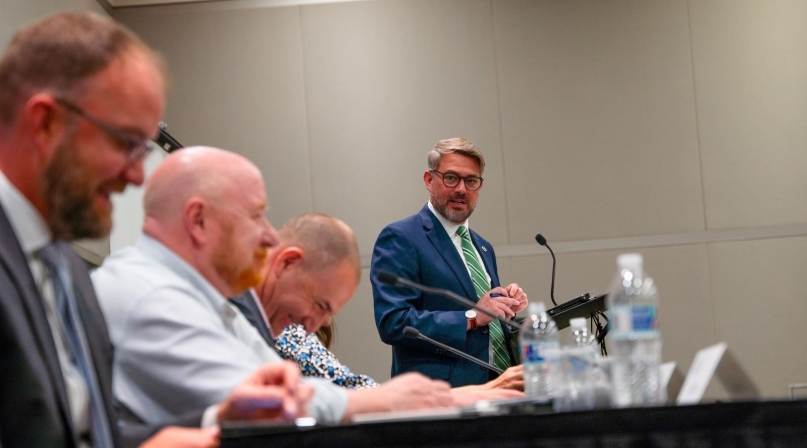Build relationships with state legislators, media to avoid local government preemption laws

Key Takeaways
Building relationships with state representatives and the press is the way to ensure counties still have a seat at the table amid the national rise in state preemption bills, according to county state association directors.
In the past decade, there has been a drastic increase in states passing laws that preempt county authority and limit local policymaking. This year alone, more than 600 different preemptive laws have been proposed by legislatures.
“This is in fact going on everywhere,” said Ginger Delegal, executive director of the Florida Association of Counties.
“… These new preemptive laws and bills are deregulatory and sweeping in nature — some of the academics call them ‘the nuclear bombs of preemptions,’” she said.
“And this is where you might have an example of a bill that says something like, ‘All cities and counties are expressly preempted from enacting or passing any measure that affects commerce.’ Well, commerce is a term of art and the truth is, in the governmental space, it basically means everything,” she added.
Delegal attributes the rise in preemption bills to four issues:
- Population growth, which in turn leads to diversity and a “less unified way of thinking”
- Counties asking for state and federal funding at unprecedented levels
- State governments expanding their capacity to provide services that were previously controlled by counties
- The erosion of the local press.
“Have you ever said to a child, or when you were a child was it said to you? ‘If you live under my roof, you live by my rules,’” Delegal asked. “That’s what this is about. Some of this is we are asking for a lot of money, and you’re getting the money because, let’s face it, we’re a rich country. So, we’re getting the money for great projects — storm water, beach renourishment, transportation, housing — all of these things come with strings attached, and some of these preemptions are the strings attached.”
“… Not having the local independent newspapers on the corners anymore is also contributing to this, because our stories are not being told — good, bad and indifferent. No one really hears about the work that is going on in local communities and in local government.”
Preemption bills, which Delegal called “partisan and ideological in nature,” are most common in states with a “trifecta” of power, like Florida and California, where one political party holds control in the governorship as well as the state Senate and state House.
“They’re solutions in search of a problem,” Delegal said. “You ask state legislators or you ask committee staff when you see a bill of this nature, ‘Who in the world are you targeting?’ And they might say, ‘Well, it’s not happening here, but there was a story out of California, and we want to make sure that that doesn’t happen here.’”
Eric Bryson, executive director of the Montana Association of Counties, recommended building relationships with state representatives as the way to try to stay ahead of possible preemption legislation.
“As tough as that can be, that has to be one of your top layers,” Bryson said. “Because your associations and your lobbyists can only be as good as the relationships that you build with those guys. We need to change the conversation — Democrat, Republican, doesn’t matter — we need to get to a point where we used to be, where we had sort of a joint goal and objective in providing our services for our constituents in the most economical manner possible.
“… The only way we’re going to get out of this is to try and get local government to not be the boogeyman anymore, and then we can fight facts with facts when we have these garbage bills coming from national associations, rolling through places that try and expedite development in rural places like Montana that don’t have building codes. We spent an inordinate amount of time with lobbyists to try and get just that education piece and the only way that works is by the relationships you guys can build as elected officials with your legislators.”
Graham Knaus, executive director of the California State Association of Counties (CSAC), encouraged counties to establish relationships with local press as another tool in combating preemption. State and federal are the “what” and the “who,” while counties are the “how,” Knaus said, in how CSAC is “reframing the narrative” around tackling homelessness.
“The press is powerful when they want to be and if you can leverage your relationships and give them something, you’re effectively elevating your county and association brand to be relevant,” Knaus said. “When you do that, you have an opportunity to impact conversations in policy that you would never be invited to the table for.
“And that actually is what generated our work on homelessness, because we were getting clobbered, and we did not have any real seat at the table. And that began to change when the L.A. Times, the San Francisco Chronicle, The Sacramento Bee … every single one of those did an editorial supporting our stuff, two of them put a link to our website in it and pushed on the governor and the legislature.
“That took a massive amount of effort on our part and relationships, but that more than anything we have ever done, in relationships with folks in the administration, whatever — that one focus has had by far the biggest return back.”






